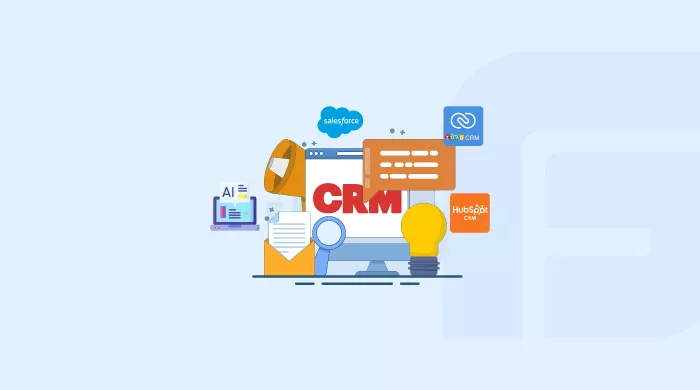Most businesses utilize Customer Relationship Management (CRM) software to manage data and nurture customer success. Well-implemented CRMs enable control of all internal processes, save time, and drive sales.
Implementing an open-source or paid CRM, which is not limited to the sales team, helps one derive more capabilities—primarily when the marketing and customer service teams use it. The company can address business needs by tailoring custom workflows into ready-made CRMs. Even though customized versions are available, ready-made CRM systems have multiple features and tool integrations that help a wide range of users.
Several medium and large companies have a custom CRM system that complements the customer relationship strategy to deliver successful customer experiences.
In some or many cases, it is not ideal to continually extend CRM features. Depending on specific business needs, one may find them wholly unnecessary, challenging to customize, or easy to use. A CRM system should streamline business processes, allowing the company to save time and avoid human errors.
This article guides businesses through the benefits of implementing CRMs, assesses the need for custom CRMs, and explains how CRMs can be tailored to an organization.
What is CRM software?
Customer Relationship Management (CRM) software helps one automate and manage the customer lifecycle for sales and marketing teams through collecting, organizing, and managing customer information. CRM helps maximize customer communication and effort, thus, increasing sales.
Why do you need CRM software?
In startups, tracking emails and contacts through spreadsheets might have seemed reasonable. However, with a growing company, one needs to look for more opportunities for growth. Collecting customer information through spreadsheets often becomes too hard and eventually becomes unsustainable. These situations are where modern CRMs help!
A well-integrated CRM software enables businesses to manage customer interaction, provide instant support, and nurture long-term relationships to evaluate the business process.
CRM software offers three significant benefits:
- Automate repetitive tasks - CRM software lets the business strategically serve the customers through standardized workflows relevant to sales, marketing, and customer support that boost existing customers' reputation and improve coordination between the teams.
- Understand the customer - CRM software allows users to access the customer and prospect information during meetings easily. One can sync all the information through multiple devices, and users can stay updated with access to the single point searchable database.
- Gain Valuable Insights - There are CRM vendors who provide analytics functionality as advanced features in their systems. Users can create customized dashboards to seek business performance and customer behavior on a specific interval to improve personalized campaigns. These reports can help with customer segmentation and track revenue.
Types of CRM Software
Three types of CRM software can help maximize business performance. Firms can combine these types depending on business requirements to save time looking for customizations.
Operational CRM
Utilizing Operational CRMs leads to organized marketing workflows, automated sales, and good customer service. The software includes features like lead management, Helpdesk, Sales pipeline, and contact management.
Analytical CRM
Analytical CRMs will be perfect for tracking the touchpoints and sales process if you manage a massive amount of data. The software provides you with statistical data, customer insights, and analytics to measure the performance to plan according to the improvement needed with real-time data and analytics.
Collaborative CRM
Collaborative CRM can be used to improve communication between teams who work on a shared database. This software comprises features like chats, discussion rooms, and file sharing to simplify internal communication and operations.
Essential Features of CRM software
These below mention features find application across diverse business verticals and companies.
- Contact Management
Contact management functionality enables the storing of the customer's contact information, such as names, addresses, contacts, and social media accounts in the database. Businesses opt for software when they want to keep communications at hand.
- Touchpoint Tracking
These features allow the tracking of communication between customer service and clients. CRM will enable the storage of the entire conversational history with the customer, improving customer service. It will be easy to track who represents a specific client and assign tasks while passing the client to another employee.
- Lead Management
Convert leads into potential customers by identifying and scoring these leads through the sales pipeline. Using the contact management feature, one can ensure lead nurturing.
- Document Management
Most of the CRM has this document management feature that enables the users to share and upload documents from a centralized location, making it easier to access the team's information. It ensures all team members are on track to deliver a consistent experience to the customers.
- Email Marketing
It can be challenging to handle a lot of emails. Integration with the email system allows the sales manager to track all communication channels in different groups. Firms can also have a sequence of emails to nurture leads and customers through a chain of emails at specific intervals, like reminders and follow-ups.
- Invoice Management
If a business uses full sales-based CRM, invoicing is one of the key features one will need. It helps create and send proposals. Companies can also integrate an accounting solution and payment systems to track the status, send quick invoices, and many more.
- Pipeline Management
Manage and track the sales processes, with a holistic pipeline view where the users can find the new leads, existing contacts, qualifies leads, etc. The pipeline features let one understand where exactly the business loses customers and track the number of sales at every moment.
- Workflow Automation
The automation features handle repetitive tasks by customizing the workflows. For instance, they can trigger an action to send follow-up reminders to a segmented contact list. CRM can streamline workflows with automation.
Advanced CRM features
- Reporting and Analytics
Reports and analytics are the primary sources to get customer insights. It allows the users to collect data depending on the business requirements and have an in-depth understanding of the sale process. It can be classified as per demographics, sales, and lead types to improve planning and decision making. One can track individual customers on the go to effectively troubleshoot as the issue arises.
- Call Center Management
The customer service team can manage many incoming or outgoing calls in the company. It helps track and schedule calls and automates monitoring directly from the CRM system.
- Integration with Social Media
With the increased usage of social media, sales representatives can track social media mentions to measure brand awareness/interest and improve customer service through social media engagement. (Reply to clients messages or reviews on social media)
- Mobile Application
A mobile version of a CRM is quite popular among sales representatives to meet the customer anytime and anywhere to provide the fastest response. If the software requirements are for the sales team, we can consider building CRM supporting smartphones. Studies show that the mobile version is more likely to boost employee productivity and empowers the sales reps to achieve annual sales goals.
- Chatbots
Chatbots have been the best tools to initiate conversations with customers and potential leads. When it comes to the CRM system, chatbots can automate a couple of tasks according to their queries. It includes answering FAQs, gathering contact information, scheduling a call, employee onboarding process, and automating several routine tasks that would accelerate the team's overall efficiency.
- Integration with other Software
CRM systems usually allow third-party integration to make tasks easier for the sales team. A CRM is not the only software to be included in other business processes, and should also consider uniting other software that would reflect in a seamless workflow. It can be business solutions like ERP tools, Warehouse Management Software, and Logistics Management Software. Businesses can merge such software with the help of a development team to save time and money.
Should I Customize a ready-made CRM or Own CRM software?
As mentioned before, there are several reasons why a ready-made CRM fails to satisfy users. Every business's workflows are unique, and there is no universal CRM that works for everyone.
As CRM software targets a wide range of businesses, customizing the available features can be more difficult and time-consuming. Some popular CRMs include Hubspot, Zoho, and Salesforce. It is often challenging to adapt the features provided into one that addresses a firm's particular needs.
In case businesses are growing or, conversely, losing opportunities due to a lack of customization, one can own a CRM development that will align with the business goals and workflows. With well-defined goals, one can identify the specific features the organization will prefer in the CRM. It will not only be cost-effective but also eliminate organizational inefficiency.
Indeed, these are the signals why businesses go for custom CRM development. Ready-made CRM solutions have features to integrate social media and email lists, but there are fewer possibilities to work with internal databases or integrate other software. It also can be expensive, where the firm needs to buy software packed with dozens of unnecessary features.
There is also a situation where one does not need to develop a CRM solution. A business can always tailor ready-made solutions to business when experiencing a stable customer flow - especially when a firm has a small client database that is easy to control.
3 Ways to Customize a ready-made CRM
We have three ways to customize ready-made CRM software, considering some of the major issues faced during the process.
- Take advantage of the open-source CRM software, where the code is fully accessible, and a business's development team can make changes to implement features or third-party integrations. With higher customization properties, one can turn the open-source CRM into a versatile solution for business.
- Go for paid CRM software with platforms and SDK. It will allow customizing the solution, but it requires licenses and operates with closed code.
- Avail of customer relationship programs with a range of capabilities offered by the CRM solution vendor. One can personalize the software and remove unnecessary features that do 'not align with the workflows.
Benefits of Custom CRM Development
While discussing the complexities of ready-made CRM software, let's discuss what makes custom development a profitable idea.
- Custom Features. It is a personalized approach that enables one to include functionalities as needed. A business can keep expanding the features depending on the comfort of use.
- Easy Integrations. It is an add on where organizations can integrate any platform into a CRM software for optimized workflows. One can control every task from a single interface and streamline internal communications.
- Interface. When opting for custom development, there are higher possibilities of integrating a user-friendly interface into existing databases.
- Security. Developing a CRM offers optimal data security; all business information stays intact within the database.
- Scalability. Custom CRM development is highly flexible and can complement the business process to scale the business smoothly.
You can also look to choose the best free and open source CRM software such as Bitrix24 SuiteCRM, HubSpot CRM. Espo CRM, etc. There are far more options, such as Funnel CRM, Intellistant CRM, DigitalCRM, Zoho CRM, Salesforce CRM, and more.
Bottom Line
So, now one would have understood why and how CRM software adds the most value to businesses.
Can Modern CRM software be Tailored to Businesses' needs? Yes, but there is a disclaimer. Ready-made CRM software can be customized only to a certain extent, depending on the functionalities available.
While evaluating different CRMs, get ready to adopt the available features. An organization's decision-maker can choose the best platform that meets their specific requirements.
Plan to build a Custom CRM? Collaborate with the best technology partners to develop an ideal CRM solution. Start research on top development companies on Goodfirms. Depending on interest and resource availability, one can hire a dedicated team of software developers to build a CRM that satisfies all the companies' needs.








